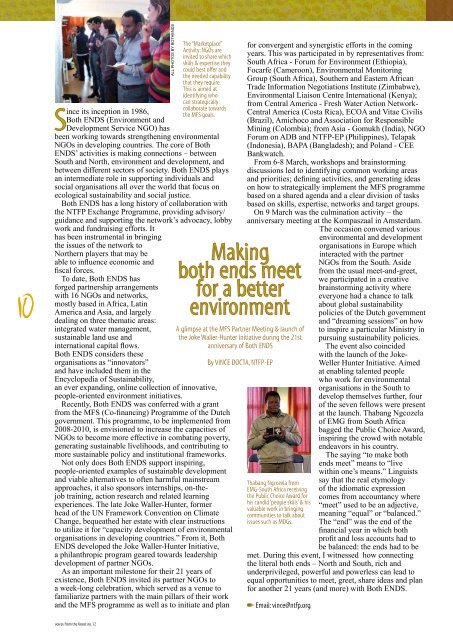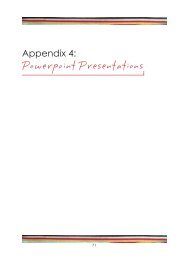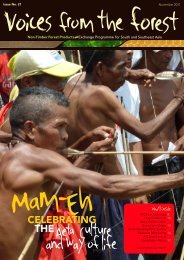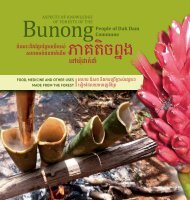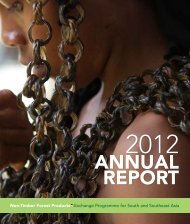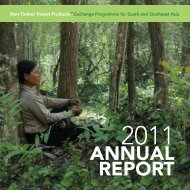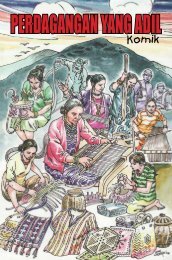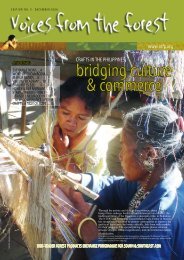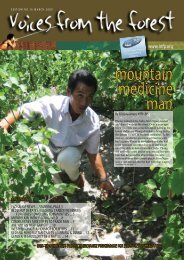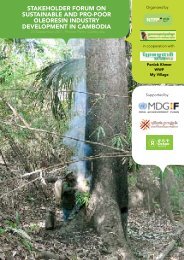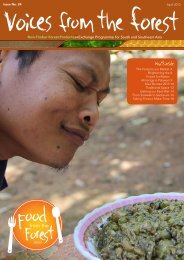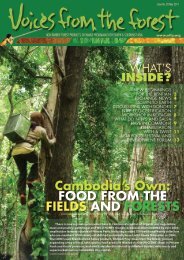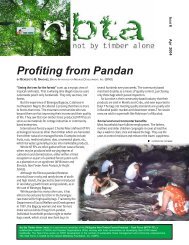Edition No. 12 - Non-Timber Forest Products Exchange Programme
Edition No. 12 - Non-Timber Forest Products Exchange Programme
Edition No. 12 - Non-Timber Forest Products Exchange Programme
You also want an ePaper? Increase the reach of your titles
YUMPU automatically turns print PDFs into web optimized ePapers that Google loves.
ince its inception in 1986,Both ENDS (Environment andDevelopment Service NGO) hasbeen working towards strengthening environmentalNGOs in developing countries. The core of BothENDS’ activities is making connections – betweenSouth and <strong>No</strong>rth, environment and development, andbetween different sectors of society. Both ENDS playsan intermediate role in supporting individuals andsocial organisations all over the world that focus onecological sustainability and social justice.Both ENDS has a long history of collaboration withthe NTFP <strong>Exchange</strong> <strong>Programme</strong>, providing advisory/guidance and supporting the network’s advocacy, lobbywork and fundraising efforts. Ithas been instrumental in bringingthe issues of the network to<strong>No</strong>rthern players that may beable to influence economic andfiscal forces.To date, Both ENDS hasforged partnership arrangementswith 16 NGOs and networks,mostly based in Africa, LatinAmerica and Asia, and largelydealing on three thematic areas:integrated water management,sustainable land use andinternational capital flows.Both ENDS considers theseorganisations as “innovators”and have included them in theEncyclopedia of Sustainability,an ever expanding, online collection of innovative,people-oriented environment initiatives.Recently, Both ENDS was conferred with a grantfrom the MFS (Co-financing) <strong>Programme</strong> of the Dutchgovernment. This programme, to be implemented from2008-2010, is envisioned to increase the capacities ofNGOs to become more effective in combating poverty,generating sustainable livelihoods, and contributing tomore sustainable policy and institutional frameworks.<strong>No</strong>t only does Both ENDS support inspiring,people-oriented examples of sustainable developmentand viable alternatives to often harmful mainstreamapproaches, it also sponsors internships, on-thejobtraining, action research and related learningexperiences. The late Joke Waller-Hunter, formerhead of the UN Framework Convention on ClimateChange, bequeathed her estate with clear instructionsto utilize it for “capacity development of environmentalorganisations in developing countries.” From it, BothENDS developed the Joke Waller-Hunter Initiative,a philanthropic program geared towards leadershipdevelopment of partner NGOs.As an important milestone for their 21 years ofexistence, Both ENDS invited its partner NGOs toa week-long celebration, which served as a venue tofamiliarize partners with the main pillars of their workand the MFS programme as well as to initiate and planALL PHOTOS BY BOTHENDSThe “Marketplace”Activity: NGOs areinvited to share whichskills & expertise theycould best offer andthe needed capabilitythat they require.This is aimed atidentifying whocan strategicallycollaborate towardsthe MFS goals.for convergent and synergistic efforts in the comingyears. This was participated in by representatives from:South Africa - Forum for Environment (Ethiopia),Focarfe (Cameroon), Environmental MonitoringGroup (South Africa), Southern and Eastern AfricanTrade Information Negotiations Institute (Zimbabwe),Environmental Liaison Centre International (Kenya);from Central America - Fresh Water Action Network-Central America (Costa Rica), ECOA and Vitae Civilis(Brazil), Amichoco and Association for ResponsibleMining (Colombia); from Asia - Gomukh (India), NGOForum on ADB and NTFP-EP (Philippines), Telapak(Indonesia), BAPA (Bangladesh); and Poland - CEEBankwatch.From 6-8 March, workshops and brainstormingdiscussions led to identifying common working areasand priorities; defining activities, and generating ideason how to strategically implement the MFS programmebased on a shared agenda and a clear division of tasksbased on skills, expertise, networks and target groups.On 9 March was the culmination activity – theanniversary meeting at the Kompaszaal in Amsterdam.The occasion convened variousenvironmental and developmentorganisations in Europe whichinteracted with the partnerNGOs from the South. Asidefrom the usual meet-and-greet,we participated in a creativebrainstorming activity whereeveryone had a chance to talkabout global sustainabilitypolicies of the Dutch governmentand “dreaming sessions” on howto inspire a particular Ministry inpursuing sustainability policies.The event also coincidedwith the launch of the Joke-Weller Hunter Initiative. Aimedat enabling talented peoplewho work for environmentalorganisations in the South todevelop themselves further, fourof the seven fellows were presentat the launch. Thabang Ngcozelaof EMG from South Africabagged the Public Choice Award,inspiring the crowd with notableendeavors in his country.The saying “to make bothends meet” means to “livewithin one’s means.” LinguistsThabang Ngcozela fromEMG-South Africa receivingthe Public Choice Award forhis candid ‘people skills’ & hisvaluable work in bringingcommunities to talk aboutissues such as MDGs.say that the real etymologyof the idiomatic expressioncomes from accountancy where“meet” used to be an adjective,meaning “equal” or “balanced.”The “end” was the end of thefinancial year in which bothprofit and loss accounts had tobe balanced: the ends had to bemet. During this event, I witnessed how connectingthe literal both ends – <strong>No</strong>rth and South, rich andunderprivileged, powerful and powerless can lead toequal opportunities to meet, greet, share ideas and planfor another 21 years (and more) with Both ENDS.Email: vince@ntfp.orgvoices from the forest no. <strong>12</strong>


